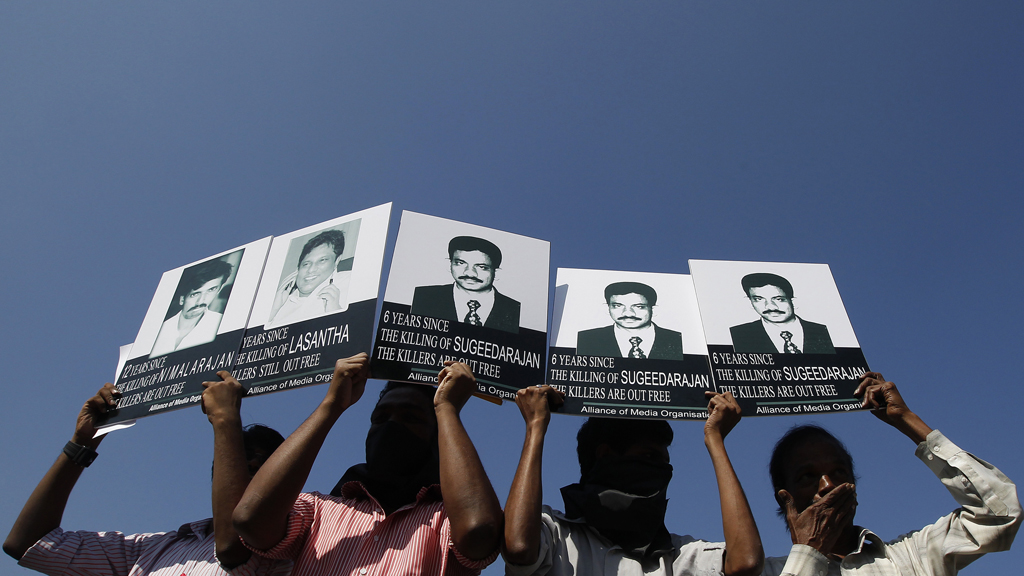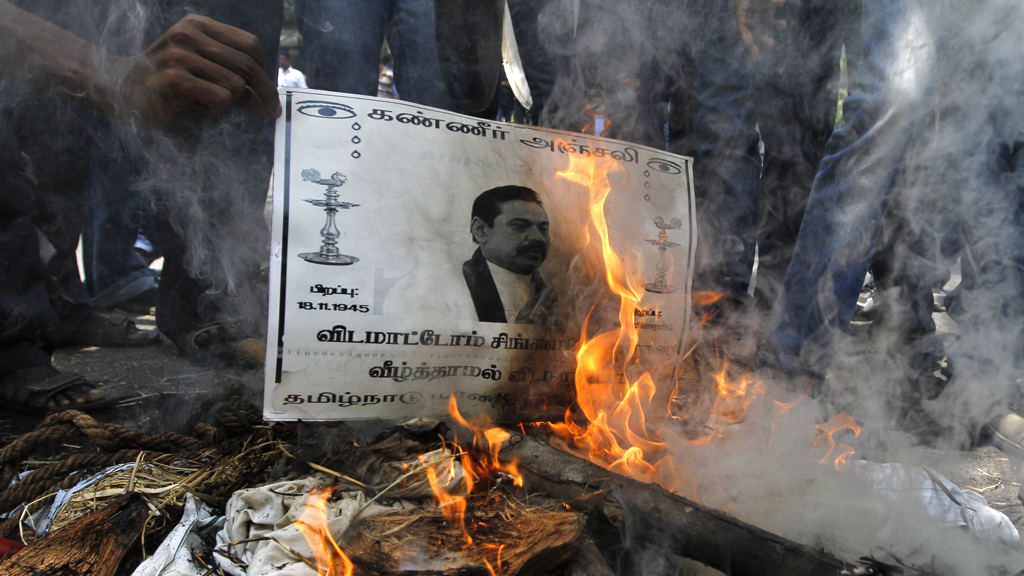Radio interference row between Sri Lanka and BBC
Amid growing alarm over the muzzling of the media in Sri Lanka, its state broadcaster has denied censorship in a row that has seen the suspension of BBC World Service broadcasts.

Members of the Alliance of Media Organisation protest hold placards of missing journalists in Colombo.
A day after the BBC pulled the plug on a lucrative broadcasting contract with its Sri Lankan counterpart, the chairman of the Sri Lankan Broadcasting Corporation (SLBC) has strenuously denied accusations of “unacceptable” and “targeted” state censorship, which triggered the row.
The Foreign and Commonwealth Office told Channel 4 News of its concern about the situation.
An FCO spokesperson said the government would have considered using diplomatic channels to help resolve the dispute had it been approached by the BBC.
This shows the government’s callous disregard for press freedom and its continued flagrant attack on the collective national life of the Tamil people. Bashana Abeywardane, Journalists for Democracy, Sri Lanka
But the FCO – which will continue to fund the BBC World Service until next April – said the broadcaster had neither informed it of the problem nor approached it for diplomatic assistance. The Sri Lankan government has declined to comment on the dispute.
SLBC Chairman Hudson Samarasinghe has, however, forcefully rejected claims that his organisation interfered with BBC news and current affairs programming, which, until Tuesday night, was re-broadcast by SLBC on FM in both Tamil and Sinhalese languages.
‘Not guilty of censorship’
In a telephone interview with Channel 4 News from Colombo, Mr Samarasinghe said: “I am not guilty of censorship. We did not interfere.” He also claimed he had not yet been officially informed of the decision to suspend the BBC service but confirmed that SLBC was no longer airing BBC output.
The BBC accused SLBC of interference of several of its programmes since 16th March. The disruptions coincided with the examination of Sri Lanka’s human rights record by the United Nations Human Rights Council in Geneva. After the initial disruption of programming, the BBC says it warned SLBC that they “were in breach of their broadcasting agreement.”
The final straw was the disruption of a programme on Monday, which led to the suspension. It is understood that the programme was a translated report from the resident BBC Colombo Correspondent, Charles Haviland, who had investigated attacks on Sri Lankan Muslims by Buddhist nationalists.
Bashana Abeywardane, coordinator of Journalists for Democracy in Sri Lanka – a group of reporters who have fled into exile – told Channel 4 News: “With the local media on the island kept under strict government control, the international media, including the BBC Tamil service, were a crucial source of information.
“This shows the government’s callous disregard for press freedom and its continued flagrant attack on the collective national life of the Tamil people.”
BBC service ‘vital’
Another exiled Sri Lankan journalist described the BBC Tamil service as “vital” adding that “the suspension is going to hit them very hard.” Although the BBC also broadcasts on shortwave and over the internet, audiences in the Tamil north of Sri Lanka are thought to be small, owing to limited access to shortwave radios and computers.
The journalist said SLBC’s interference in the broadcasts consituted a “denial of the Tamil people’s ‘right to know’.” The government, the reporter said, was now determining what it thinks the Tamil people “need to know”.
I want to maintain peace and harmony and not have communal riots. I do not want to broadcast extremist ideas as they can lead to communal unrest. SLBC Chairman Hudson Samarasinghe
Announcing the suspension of both Tamil and Sinhalese language services on Tuesday, Peter Horrocks, director of the BBC World Service, branded the interference “a serious breach of trust” with its audiences in Sri Lanka “which the BBC cannot allow”. The SLBC contract is understood to be worth $300,000 a year to the cash-strapped broadcaster.
The BBC World Service prides itself on its editorial independence and impartiality. Sri Lankan Tamil sources told Channel 4 News that the affected programmes were replaced on the BBC Tamil-language service, by pro-government propaganda.

Image: College students burn a poster of Sri Lanka’s President Mahinda Rajapaksa
Two years ago, the BBC reinstated its FM programming in Sri Lanka following a 14-month-long suspension of service for similar reasons. At the time, Mr Horrocks said the SLBC had provided assurances that BBC programmes would be broadcast uninterrupted and that the contractual agreement would be respected.
Programmes which were disrupted over the past two weeks included coverage of debate over alleged war crimes committed by Sri Lankan government forces during the final months of the civil war against Tamil insurgents which ended four years ago. The interference in programming was monitored by numerous organisations, including the BBC and Channel 4 News.
‘I do not want to broadcast extremist ideas’
While denying interference in BBC transmissions, the SLBC chairman told Channel 4 News: “As a broadcaster, I want to maintain peace and harmony and not have communal riots. I do not want to broadcast extremist ideas as they can lead to communal unrest.”
When asked to clarify if he was accusing the BBC of this, he responded: “They have had LTTE leaders in Bush House!”
Bush House was until recently the home of the World Service and the Liberation Tigers of Tamil Eelam (LTTE) were defeated in May 2009.
Responding to news of the suspension of the service, Fred Carver director of the London-based Sri Lanka Campaign, said he was “pleased that the BBC has stuck to its guns. It’s sad for Sri Lanka though.” He said the broadcast disruptions were “the latest in a long line of attempts to prevent Sri Lankan Tamils from understanding the truth about the Geneva human rights process.”
Press freedom concerns
The censorship row between the two broadcasters coincides with growing disquiet over press freedom in Sri Lanka.
Since 2006, at least 14 Sri Lankan journalists have been killed; many more have fled – including a BBC correspondent who was a Sri Lankan national.
The resident BBC Colombo Correspondent, Charles Haviland, was threatened by a mob of Sinhalese Buddhists last month, while reporting on rising religious tensions. Earlier this month, the Sri Lankan state media broadcast threats from the military to hunt down “those working for Channel 4,” which has broadcast prima facie evidence of extra-judicial executions by the Sri Lankan security forces.
Sri Lanka is to host the Commonwealth Heads of Government Meeting this November.
Two weeks ago, the Queen signed the new Commonwealth Charter, committing member states to the it’s “shared values” which include democracy, human rights and freedom of expression.